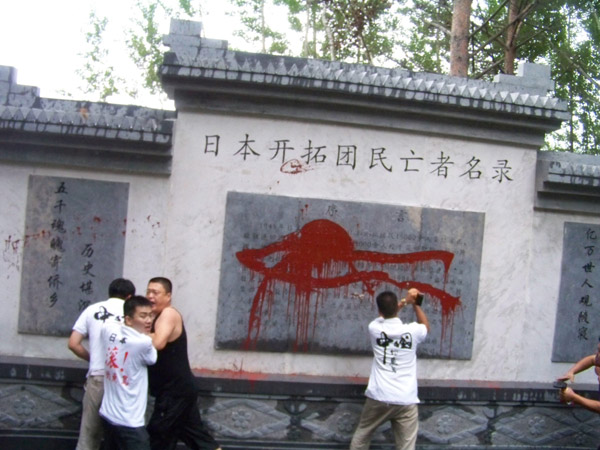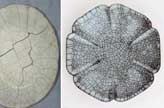Hot issues
Men defiant after failing to destroy wailing wall
Updated: 2011-08-05 07:36
By An Baijie and Tian Xuefei (China Daily)
HARBIN - Local police have released five Chinese netizens who are suspected of splashing paint on a small wailing wall that was built to commemorate Japanese paramilitary immigrants.
 |
|
Three Chinese netizens splash red paint on a small wailing wall dedicated to Japanese immigrants who came to China from 1932 to 1945 in Fangzheng county, Northeast China's Heilongjiang province, on Wednesday. [Photo/China Daily] |
The wall, which bears the names of 229 people, was put up by the Fangzheng county government, in Heilongjiang province, as a memorial to the more than 5,000 Japanese who stayed and died in the county following the Japanese army's defeat in 1945. According to estimates, 35 million Chinese people were killed or wounded in the war.
The five men in the case - Wu Qingjun, Chen Fule, Song Huaduo, Zhang Zhecheng and Liang Zhi - went to Fangcheng county from Hunan, Hebei and Henan provinces on Wednesday. There they first tried to destroy the memorial with a hammer and, seeing that attempt fail, splattered it with red paint.
Alerted to the destruction, local police rushed to the scene and detained the five men after a fight.
The five were released on Wednesday night after being interrogated and came to Beijing on Thursday.
Wu Qingjun, the alleged organizer of the vandalism, called on top officials in Fangzheng county to "resign for putting up this wailing wall and humiliating the feelings of the Chinese people".
The five men are members of "The Protecting Diaoyu Islands Association," an online organization that is dedicated to protecting China's sovereignty over the Diaoyu Islands off the east coast of the mainland, which are also claimed by the Japanese government.
At a return party for the five men in Beijing, their supporters held up a banner that read "Welcome back to the five brave wall-breakers!".
"Shame on the Fangzheng government," the five men and their supporters chanted while posing for a photograph. "(The local government should) apologize immediately."
The Fangzheng county government refused to comment when called by China Daily on Thursday, only saying many of the netizens who have written online about the case are making too much of it.
Hong Zhenguo, executive deputy head of Fangzheng county, said on Tuesday that the local government spent 500,000 yuan ($77,650) to build two wailing walls. One of them commemorates the Japanese immigrants and the other the Chinese parents who adopted the children of those immigrants.
The first of the wailing walls reflects the kindness of local residents, Hong said, adding it has also helped to teach Japanese visitors about the history of the war.
From 1932 to 1945, the Japanese government sent more than 200,000 emigrants, some of them ex-servicemen, to Northeast China, which was then under Japanese rule. Their primary mission was to establish a colony.
Akiyama Hiroki, deputy consul of the Consulate General of Japan in Shenyang, capital of Liaoning province, said the wailing wall was set up by the local government, and the Japanese government has not put money or materials toward the project.
The wall has drawn anger from local residents and the sons and daughters of Chinese soldiers, especially those whose fathers had fought against the Japanese invaders.
Li Min, 88, a veteran who fought against Japanese troops in Northeast China during World War II, said the Japanese paramilitary immigrants were armed with weapons, some of which came from Japanese troops.
"Chinese farmers had to hand in their vegetables and grain to the immigrants after our harvests, or they would be thrown into prison and charged with economic crimes," Li said.
He said it's absurd to build wailing walls for the invaders, especially at a time when the Japanese are revising their history books and refusing to acknowledge that their forbearers had invaded China.
"We will return to Fangzheng someday to destroy the wall if it is not demolished by the local government," Chen Fule was quoted by Legal Evening News as saying on Thursday.
Zhao Yinan, Zhou Huiying and Yu Haiping contributed to this story.
E-paper

Double vision
Prosperous Hangzhou banks on creative energies to bridge traditional and modern sectors
Minding matters
A touch of glass
No longer going by the book
Specials

Ancient plate broken
An ancient porcelain plate was accidentally destroyed during a research in the Palace Museum.

Selfless actions
A 20-year-old girl becomes an Internet star for giving her first kiss to a drowning old man.

Space race
Homebuyers are learning the hard facts of supply and demand: too many cars and too few parking spaces.
